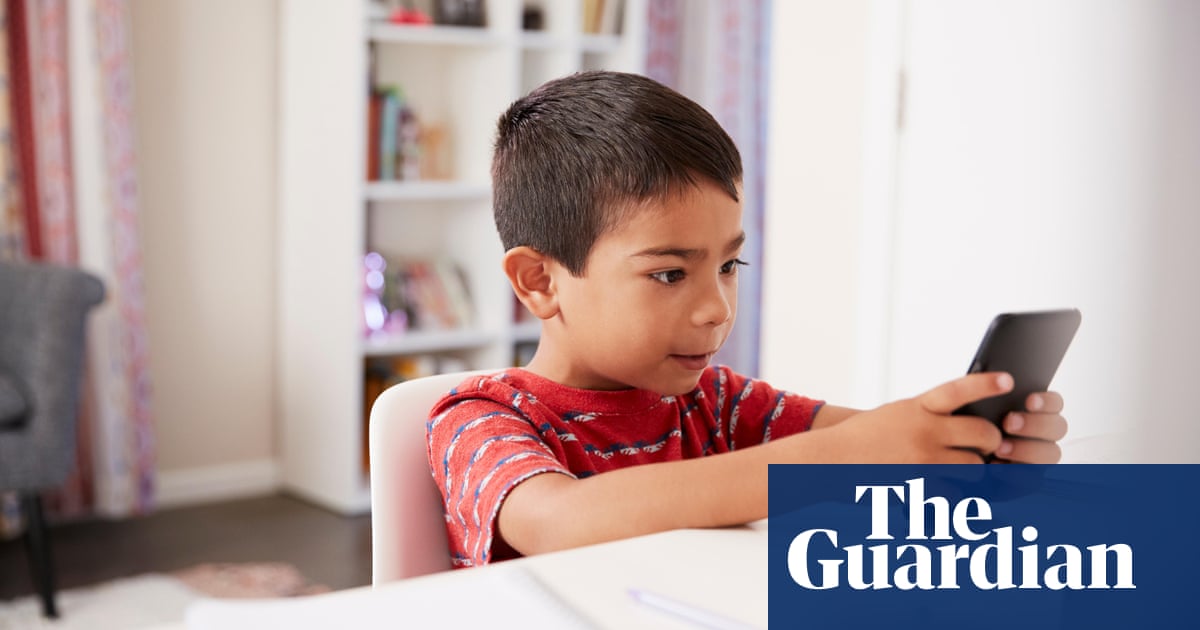
A quarter of three- and four-year-olds in the UK now own a smartphone, while half of children under 13 are on social media, according to new data that comes as ministers consider banning all children under 16 from owning a mobile phone.
The figures, from the communications regulator Ofcom, show high and rising rates of online activity by children of infant-school age, with 38% of five- to seven-year-olds using social media, compared with 30% a year ago, and 76% of them using a tablet.
The findings will boost the argument of those close to Rishi Sunak who have been urging him to clamp down on phone and social media use by young children.
Ministers will launch a consultation on what measures to take within weeks, according to government sources.
The consultation will include a proposal to ban mobile phone sales to under-16s, one to make it easier for parents to put parental controls on devices, and one to raise the minimum age for social media sites from 13 to as high as 16. Ofcom also found that half of children aged three to 12 use at least one social media app, despite the minimum age requirement of 13.
Michelle Donelan, the technology secretary, said in a statement: “Children as young as five should not be accessing social media, and these stark findings show why our Online Safety Act is essential.
“Most platforms say they do not allow under-13s on to their sites, and the act will ensure companies enforce these limits or they could face massive fines. If they fail to comply with Ofcom decisions and keep children safe, their bosses could face prison.”
She added: “Protecting children online is our No 1 priority and we will not hesitate to build on the act to keep them safe.”
The figures come amid growing evidence of the impact of widespread social media use among children. The US government has warned that social media poses a “profound risk” to the mental health and wellbeing of children and teenagers, with the number of children and adolescents dealing with depression and anxiety having risen almost 30% in recent years.
Jonathan Haidt, a US academic whose book The Anxious Generation has been cited as influencing No 10’s thinking on children and social media, told the Guardian the mobile phone ownership figures were “very disturbing”. Ofcom research also showed around a quarter of five- to seven-year-olds owned a smartphone.
“Something must be done to reverse this trend,” said Haidt, a social psychologist at New York University’s Stern School of Business. He added that parents should work with schools to set a new norm: “Don’t give children a smartphone before the end of secondary education, around age 16.”
Child online safety campaigners also called on the government to act. The Molly Rose Foundation said Ofcom had to crack down on platforms that “turn a blind eye” to age requirements, while the NSPCC called for “robust enforcement” of the Online Safety Act, which has provisions on enforcing social media age limits.
Joe Ryrie, co-founder of the group Smartphone Free Childhood, said the statistics showed that social media and smartphone use “is a systemic problem and it’s only getting worse.”
Ofcom’s annual study of children’s online habits also found the proportion of five- to seven-year-olds sending messages or making voice and video calls had risen from 59% to 65% compared with a year ago. The number of children in that cohort using WhatsApp rose from 29% to 37% and the proportion using TikTok increased from 25% to 30%.
Overall, 96% of all children aged between three and 17 go online, with the vast majority of the 4% who are still offline being aged three or four. Even among that demographic – the youngest children surveyed – 84% use the internet.
Generally, younger children who are allowed online use a tablet, while secondary-school-age children are more likely to have a smartphone, with more than 95% of 12- to 15-year-olds being given their own mobile phone.
The smartphone figures were based on an Ofcom survey of 2,480 parents of children aged between three and 17. It defined a smartphone as a handset that allows individuals to easily download apps, view websites and generally go online.












